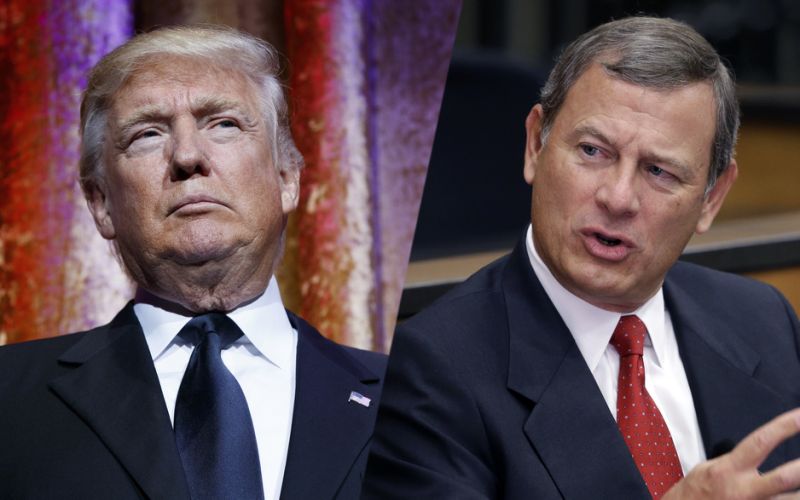Chief Justice John Roberts defended the independence and integrity of the federal judiciary today, issuing a statement rebuking President Trump’s criticism of a judge who had ruled against the administration’s asylum policy.
It’s the first time the Republican-appointed leader of the federal judiciary has offered even a hint of criticism of Trump, who has previously blasted federal judges who ruled against him.
Roberts said today the U.S. doesn’t have “Obama judges or Trump judges, Bush judges or Clinton judges.”
 Roberts said on the day before Thanksgiving that an “independent judiciary is something we should all be thankful for.”
Roberts said on the day before Thanksgiving that an “independent judiciary is something we should all be thankful for.”
The White House had no immediate response to a request for comment on Roberts’ criticism.
Trump had spoken yesterday when a reporter asked for his reaction to a ruling by U.S. District Judge Jon Tigar in San Francisco that put the administration’s asylum policy on hold.
The president complained that his opponents file lawsuits in courts that are part of the liberal-leaning 9th U.S. Circuit Court of Appeals. Before he took office, conservative groups tended to bring challenges to Obama-era policies in Texas, part of the conservative-leaning 5th U.S. Circuit Court of Appeals.
“Every case that gets filed in the 9th Circuit, we get beaten. And then we end up having to go to the Supreme Court, like the travel ban, and we won,” Trump said.
The president went on to say about the asylum ruling: “This was an Obama judge. And I’ll tell you what, it’s not going to happen like this anymore. ”
But the initial travel ban ruling in 2017 was issued by U.S. District Judge James Robart, an appointee of President George W. Bush.
It was unclear what Trump meant when he said things would change.
The 9th Circuit is by far the largest of the federal appellate courts, covering Alaska, Arizona, California, Hawaii, Idaho, Montana, Nevada, Oregon and Washington. Some Republicans in 9th Circuit states have proposed splitting the circuit in two, but legislation has not advanced.
Several justices have spoken out about judicial independence and the danger of having the court viewed as a political institution that is divided between five conservative Republicans and four liberal Democrats.
Roberts is widely seen as the justice closest to the middle and likely to determine the outcome of high-profile cases that split the court.
